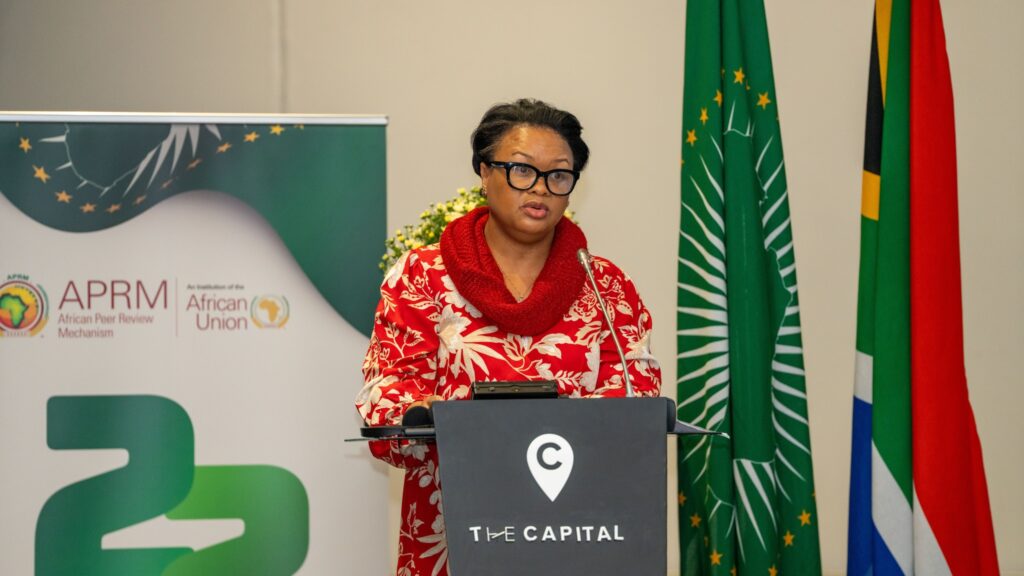
By Baboloki Semele: The African Union Peace and Security Council (AU PSC) and the African Peer Review Mechanism (APRM) have commenced their 4th Annual Joint Retreat in Johannesburg, South Africa, under the theme: “Good Governance: A Pillar for Conflict Prevention and Sustainable Peace in Africa.” This two-day retreat brings together policymakers, governance experts, and stakeholders to deliberate on the critical role of governance in fostering peace and security across the continent.
In her opening remarks, APRM CEO Ambassador Marie-Antoinette Rose Quatre emphasized the urgent need for proactive measures in conflict prevention. Reflecting on historical lessons, she stated, “The tragic events of the past, such as the genocide in Rwanda, underscore the necessity for early intervention and actionable strategies in our governance and peace efforts.” Ambassador Quatre highlighted the APRM’s strategic plan aimed at advancing collaborative solutions to promote stability and democracy throughout Africa.

This retreat builds upon the foundations laid in previous meetings between the AU PSC and APRM:
-
Inaugural Joint Retreat (2021): The first retreat emphasized the importance of integrating governance assessments into the continental peace and security framework. The communiqué from this meeting highlighted the necessity for “enhanced collaboration between the APRM and the PSC in addressing governance-related root causes of conflicts.”
-
Second Joint Retreat (2022): Discussions centered on the role of early warning systems in conflict prevention. Participants underscored “the imperative of strengthening early warning mechanisms to detect and respond to governance deficits that may lead to conflicts.”
-
Third Joint Retreat (2023): The focus was on the implementation of recommendations from APRM reviews. The AU PSC, in its 1191st meeting, adopted conclusions emphasizing “the need for Member States to address governance challenges identified through the APRM process as a means to prevent conflicts and sustain peace.” African Union Peace and Security Council
The current retreat serves as a platform to assess Member States’ progress within the APRM review process and to identify governance deficits that have historically contributed to conflicts. Insights from these discussions are expected to inform future AU policy frameworks, enhancing coherence between the AU’s governance mechanisms and its peace and security architecture.
As the retreat progresses, participants are poised to develop actionable strategies that reinforce the integral link between good governance and sustainable peace, aiming to chart a path toward a more stable and prosperous Africa.
About African Union Peace & Security Council
The Peace and Security Council (PSC) is the standing decision-making organ of the AU for the prevention, management and resolution of conflicts. It is a collective security and early warning arrangement intended to facilitate timely and efficient responses to conflict and crisis situations in Africa. It is also the key pillar of the African Peace and Security Architecture (APSA), which is the framework for promoting peace, security and stability in Africa.
The Protocol Relating to the Establishment of the Peace and Security Council was adopted on 9 July 2002 in Durban, South Africa, and entered into force in December 2003. The PSC became fully operational in early 2004. The PSC Protocol, together with the PSC Rules of Procedure, the AU Constitutive Act and the conclusions of various PSC retreats, provide operational guidance to PSC activities.
The PSC has 15 members with equal voting powers. All members are elected by the AU Executive Council and endorsed by the AU Assembly during its ordinary sessions. For continuity, five members are elected for three-year terms and 10 for two-year terms. While there are no permanent members, the PSC Protocol does not prevent any Member States from seeking immediate re-election.
About APRM
The APRM is a mutually agreed instrument voluntarily acceded to by AU member States as an African self-monitoring mechanism. The APRM is often described as “Africa’s unique and innovative approach to governance” with the objective of improving governance dynamics at the local, national and continental levels. The APRM was adopted by African Heads of State and Government as a systematic peer learning and self-assessment mechanism originating from the NEPAD foundational document, the “Declaration on Democracy, Political, Economic and Corporate Governance” adopted in Durban, South Africa in July 2002. The primary purpose of the APRM is to foster the adoption of policies, standards and practices that lead to political stability, high economic growth, sustainable development and accelerated sub-regional and continental economic integration through sharing of experiences and reinforcement of successful and best practice, including identifying deficiencies and assessing the needs for capacity building. The mandate of the APRM is to ensure that policies and practices of participating Member States conform to the agreed political, economic and corporate governance values, codes and standards contained in the African Union Declaration on Democracy, Political, Economic and Corporate Governance. As a voluntary self-monitoring instrument, APRM fosters the adoption of policies, standards and practices that lead to political stability, high economic growth, sustainable development and accelerated regional and continental economic integration through sharing of experiences and best practices, including identifying deficiencies and assessing the needs for capacity building.
